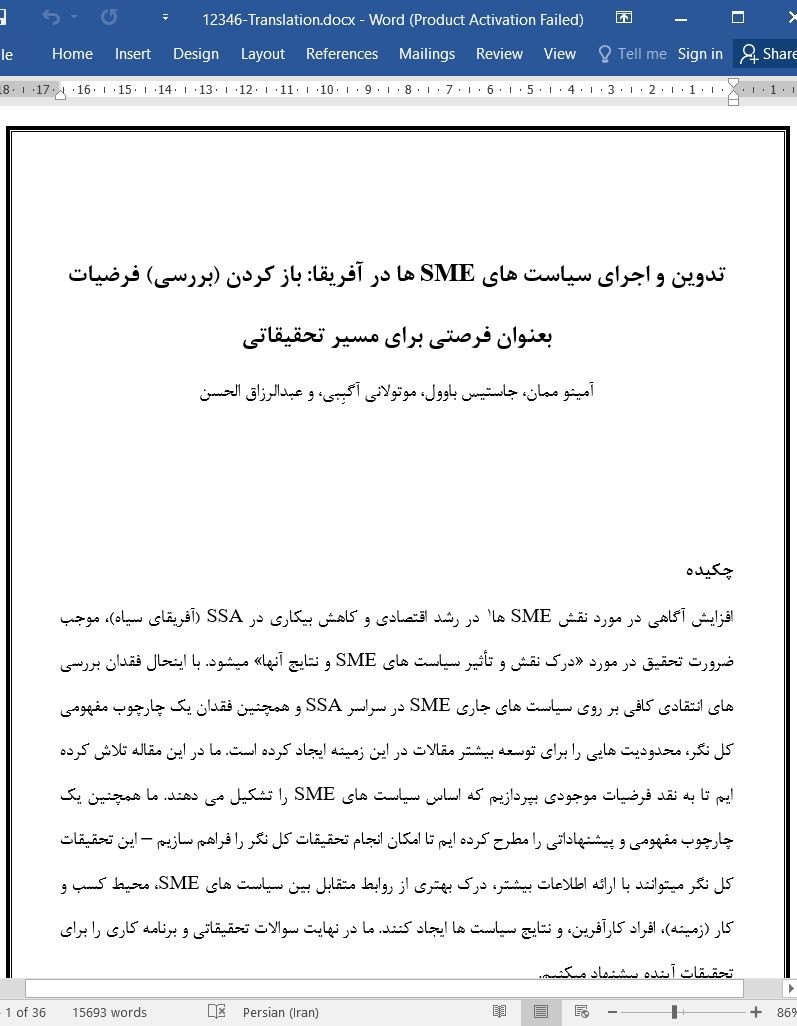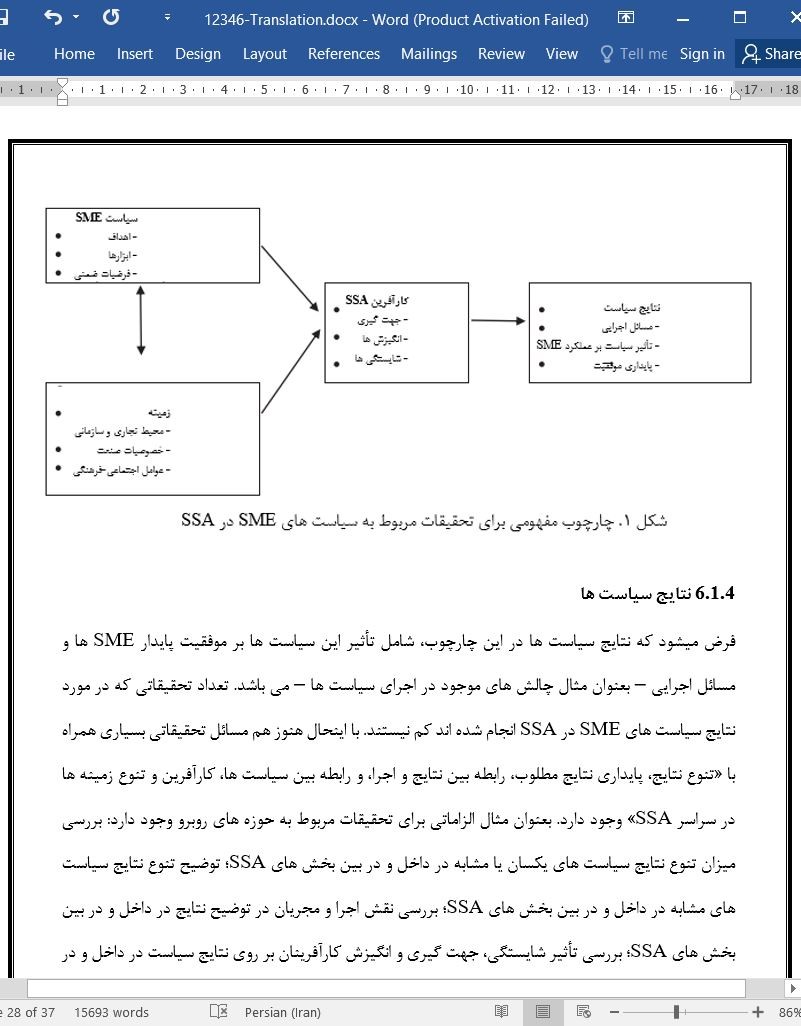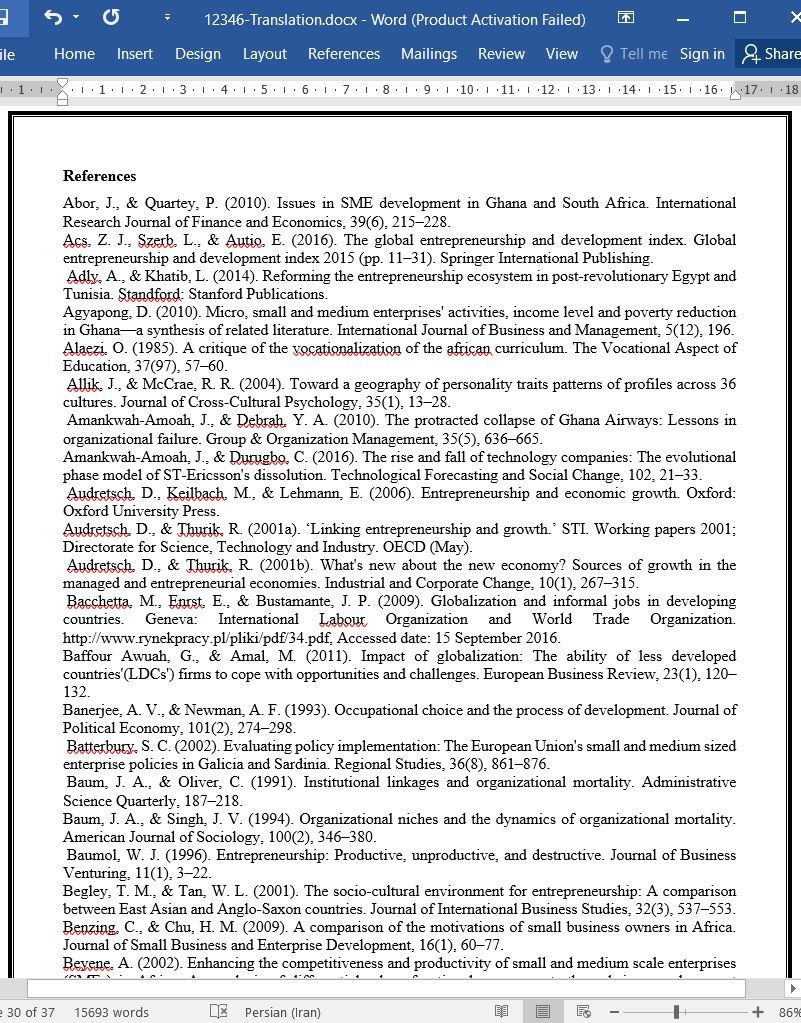
تدوین و اجرای سیاست های SME ها در آفریقا
چکیده
افزایش آگاهی در مورد نقش SME ها در رشد اقتصادی و کاهش بیکاری در SSA (آفریقای سیاه)، موجب ضرورت تحقیق در مورد «درک نقش و تأثیر سیاست های SME و نتایج آنها» میشود. با اینحال فقدان بررسی های انتقادی کافی بر روی سیاست های جاری SME در سراسر SSA و همچنین فقدان یک چارچوب مفهومی کل نگر، محدودیت هایی را برای توسعه بیشتر مقالات در این زمینه ایجاد کرده است. ما در این مقاله تلاش کرده ایم تا به نقد فرضیات موجودی بپردازیم که اساس سیاست های SME را تشکیل می دهند. ما همچنین یک چارچوب مفهومی و پیشنهاداتی را مطرح کرده ایم تا امکان انجام تحقیقات کل نگر را فراهم سازیم – این تحقیقات کل نگر میتوانند با ارائه اطلاعات بیشتر، درک بهتری از روابط متقابل بین سیاست های SME، محیط کسب و کار (زمینه)، افراد کارآفرین، و نتایج سیاست ها ایجاد کنند. ما در نهایت سوالات تحقیقاتی و برنامه کاری را برای تحقیقات آینده پیشنهاد میکنیم.
1. مقدمه
آفریقای سیاه (SSA) با چالش های اقتصادی و اجتماعی مختلفی روبرو است، که تشدید تصویب سیاست های متمرکز بر توسعه کارآفرینی و همچنین بخش شرکت هایی با اندازه های کوچک و متوسط (SME) را می طلبند (بیِن 2002؛ کانگولو 2010؛ اوبِنگ و بلاندل 2015؛ راجرسون 2001، 2004؛ UNIDO، 1999). تمرکز بر کاهش بیکاری بعنوان یک هدف سیاستی (خط مشی) تا حدودی تحت تأثیر گزارشات تحقیقاتی قرار می گیرد که نشان میدهند بخش SME، در اغلب کشورهای آفریقایی 90 درصد بخش خصوصی و 50 درصد استخدام را تشکیل میدهد (UNIDO, 1999). محققان واکنش مثبتی به تمرکز بر بخش SME بعنوان موتور رشد اقتصادی، استخدام و ریشه کن کردن فقر، نشان داده اند. بعنوان مثال آگیاپونگ (2010)، آکپارا (2011)، و مانیارا و جونز (2007) در تحقیقات خود به بررسی کارایی SME ها در ریشه کن کردن فقر در نیجریه، غنا و کنیا پرداخته اند. محققان دیگری نیز پتانسیل استخدام بخش SME آفریقا را بررسی کرده اند (بین 2002؛ لانگوانگ و گوگ 2012؛ اولاوال و گاروی 2010). با اینحال بررسی کارایی SME ها نیازمند تحقیقات بیشتری توسط متخصصان و محققان است (نگاه کنید به فریس 2000؛ کیگوندو 2002؛ مک گرات و کینگ 1999) چون چالش ها و نتایج ناامیدکننده سیاست SME رو به افزایش است – که اخیراً در SSA نیز مشاهده شده است (هالمی 1993).
7. نتیجه گیری
ما این مقاله را با تأکید بر شناسایی SME ها و کارآفرینی بعنوان راه حل های بالقوه در توسعه اقتصادی آفریقا و همچنین کاهش بیکاری، آغاز می کنیم. ما همچنین بر تقویت تدوین و اجرای سیاست های SME و نحوه واکنش محققان به این سیاست ها، تمرکز می کنیم. با اینحال ما در مقاله حاضر ادعا کرده ایم که هنوز هم شکاف هایی (نواقصی) در مقالات مربوط به انتقال سودمند سیاست های غربی SME بدون توجه کردن به فرضیات موجود در داخل و در بین کشورهای SSA وجود دارد. ما همچنین با مشاهدات کیگوندو (2002) موافق هستیم که نشان میدهد تحقیقات موجود نامربوط هستند و نتوانسته اند رابطه متقابل بین تحقیقات و اجرای سیاست ها را مد نظر قرار بدهند. شاید یکی از مهمترین کمک های مقاله حاضر، چارچوب مفهومی است که برای ممکن ساختن بررسی کل نگرانه این موضوع اصلی پیشنهاد کرده است. این باید فاصله بین تحقیقات و سیاست ها را از بین ببرد و آنها را به هم متصل سازد. اگرچه عناصر موجود در متغیرها به هیچ عنوان جامع نیستند اما ما بر این باور هستیم که آنها به یک شیوه موفقیت آمیز، اغلب عناصر هنجاری را پوشش داده اند. بنابراین آنها به درک روابط بین سیاست های SME، زمینه، موفقیت یا شکست SME، و همچنین نتایج سیاست ها کمک میکنند. سوالات و پیشنهادات ارائه شده در مقاله حاضر، اطلاعات زیادی را از لحاظ برنامه کار تحقیقات و مسیر تحقیقات – خصوصاً در رابطه با تنوع زمینه ها و خصوصیات کارآفرینان در داخل و در بین کشورهای SSA – ارائه میدهند. ما امیدواریم که چارچوب و مسیر تحقیقات بصورت تجربی دنبال شوند، و یا منجر به درک بهتری از شیوه های اطمینان از این مسئله گردند که «کمکهای اجتماعی و اقتصادی بخش SME محقق شده اند». این تحقیقات همچنین منجر به اصلاح بیشتر چارچوب مفهومی می گردند.
Abstract
The increasing acknowledgement of the role of SMEs in economic growth and reducing unemployment in SSA brings forth the need for research into understanding the role and impact of the SME policy and its outcomes. However, the lack of adequate critical examination of the current SME policies across SSA as well as the absence of a holistic conceptual framework has put limitations on the further development of literature in the field. In this article, we have attempted to critique the existing assumptions underpinning the SME policy. We have also advanced a conceptual framework and propositions to enable the holistic research that can shed more light on our understanding of the interactions between SME policies, the business environment (context), the entrepreneur, and policy outcomes. Finally, we proposed research questions and an agenda that should guide future research.
1. Introduction
Sub-Saharan Africa (SSA) faces numerous economic and social challenges, which have necessitated the intensification of policy enactment directed towards the development of entrepreneurship as well as the Small and Medium-Scale Enterprises (SMEs) sector (Beyene, 2002; Kongolo, 2010; Obeng & Blundel, 2015; Rogerson, 2001, 2004; UNIDO, 1999). The focus on reducing unemployment as a policy objective is, in part, influenced by research reports that indicate that the SME sector accounts for 90% of the private sector and 50% of employment in most of the African countries (UNIDO, 1999). Researchers have responded to the targeting of the SME sector as the engine of economic growth, employment, and poverty eradication in a positive manner. For example, the research by Agyapong (2010), Okpara (2011) and Manyara and Jones (2007) examined the efficacy of SMEs in the eradication of poverty in Nigeria, Ghana and Kenya. Similarly, others have examined the employment potential of the African SME sector (Beyene, 2002; Langevang & Gough, 2012; Olawale & Garwe, 2010). Yet, the earlier call for further research by experts and researchers (see Frese, 2000; Kiggundu, 2002; McGrath & King, 1999) is still relevant because of the growing challenges and the disappointing outcomes of SME policy that have been recently seen in SSA (Hulme, 1993). Specifically, Kiggundu (2002) calls for closing the gap between research and policymaking. He also argued that the researchers have studied the African entrepreneur, the firm and the business environment in a rather disjointed manner. In his own words: “Rarely have they taken a holistic approach to studying the combined interactive effects of the three factors on entrepreneurial success or failure” (Kiggundu, 2002: 251). We argue that the lack of a framework that enables holistic study does not allow a holistic approach to the study of SMEs in SSA. Therefore, this paper attempts to fill the gap regarding the lack of guiding framework for the study of entrepreneurship policy in SSA.
7. Conclusion
We began this article by highlighting the growing recognition of the SMEs and entrepreneurship as the potential solution in Africa's economic development as well as the reducing unemployment. We also highlighted the intensification of the SME policy formulation and implementation and how the researchers have responded to it. However, the paper has argued that there are still some gaps in the literature pertaining to the wholesome transfer of Western-based SME policy without the adequate consideration of the assumptions within and across SSA countries. We also concur with the observation by Kiggundu (2002), wherein the existing research has been disjointed and fails to take into consideration the interaction between research and policy implementation. Perhaps one of the most important contributions of the paper is the conceptual framework that we advanced to enable the holistic examination of the subject matter. This should bridge the gap between the research and policy. Although the elements in the variables are by no means exhaustive, we believe that they have adequately captured most of the normative elements. Therefore, they contribute to the understanding of the interrelationships between the SME policy, context, SME success or failure, as well as the policy outcomes. The questions and propositions in the paper have much to offer in terms of the research agenda and the direction for research, especially regarding the diversity of contexts and entrepreneurs' profile within and across SSA countries. We do hope that the framework and direction for research will be pursued empirically or otherwise for a better understanding of the ways in which it can be ensured that the social and economic contributions of the SME sector have been achieved. Such research can also lead to further refinement of the conceptual framework.
چکیده
1. مقدمه
2. پیدایش تاریخی و نظری سیاست SME
3. شکست بازار بعنوان مبنایی برای تدوین سیاست SME: یک نگاه انتقادی
4. ویژگی ها و اشکال سیاست های SME
5. سیاست SME در آفریقا: ویژگی ها و خصوصیات بارز
5.1 جهت گیری کارآفرینان
5.2 سرمایه مالی بعنوان یک ابزار سیاستی
5.3 زیرساخت فیزیکی و سازمانی بعنوان یک ابزار سیاستی
5.4 رقابت در مقابل همکاری، بعنوان یک فرضیه سیاستی
5.5 فرضیه آموزش کارآفرینی
6. بسوی یک چارچوب مفهومی برای تحقیق درباره سیاست های SME در SSA
6.1 مسیرهای پیشنهادی برای تحقیقات آینده
6.1.1 سیاست SME
6.1.2 زمینه
6.1.3 جهت گیری، انگیزش و شایستگی های کارآفرینان
6.1.4 نتایج سیاست ها
7. نتیجه گیری
منابع
ABSTRACT
1. Introduction
2. Historical and theoretical emergence of SME policy
3. Market failure as foundation for SME policy formulation: A critical look
4. Features and forms of SME policies
5. SME policy in Africa: Salient features and characteristics
5.1. Entrepreneurs' orientation
5.2. Financial capital as policy instrument
5.3. Physical and institutional infrastructure as policy instrument
5.4. Competition versus collaboration as policy assumption
5.5. Entrepreneurship training assumption
6. Towards a conceptual framework for research into SME policy in SSA
6.1. Direction for research
6.1.1. SME policy
6.1.2. Context
6.1.3. Entrepreneurs' orientation, motivation and competencies
6.1.4. Policy outcomes
7. Conclusion
References
- اصل مقاله انگلیسی با فرمت ورد (word) با قابلیت ویرایش
- ترجمه فارسی مقاله با فرمت ورد (word) با قابلیت ویرایش، بدون آرم سایت ای ترجمه
- ترجمه فارسی مقاله با فرمت pdf، بدون آرم سایت ای ترجمه



